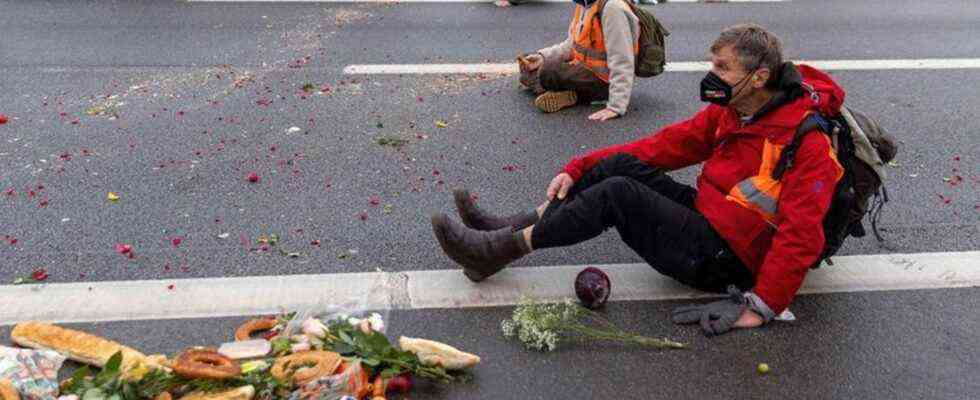demonstrations
Highway blockades by climate protectors: can that be legitimate?
Climate activists from the group “Uprising of the last generation” sit on the road and block traffic. Photo: Carsten Koall/dpa
© dpa-infocom GmbH
Since the end of January, groups of climate activists have been sitting on motorway access roads and causing traffic chaos. Sometimes there are dangerous scenes. Can this be legit?
After two and a half weeks of repeated freeway blockades by climate protectors in Berlin and elsewhere, nerves are on edge.
This is true on the street, where angry drivers recently dragged activists from the group “Uprising of the Last Generation” along with their banners for a “Food Saving Law” off the street. But it also applies in politics, where there is now a dispute: is this “civil disobedience” and therefore legitimate? Agriculture Minister Cem Özdemir took a clear position on Thursday. “I believe that road blockades harm our common goal,” he told the German Press Agency.
Police drive heavily pregnant woman
Shortly before, the Berlin police had pulled a heavily pregnant woman out of a traffic jam in the vicinity of another sit-in blockade on the A100 city motorway and driven to the hospital with blue lights flashing. In total, since January 24, demonstrators have blocked roads and motorways more than 30 times in Berlin alone. There were also campaigns in Hamburg, Munich and Stuttgart. Usually there are only five to ten, but some of them stick and cause chaos. They are calling for a law against food waste and an immediate change in agriculture to reduce greenhouse gases from agriculture.
“You certainly don’t win majorities in society by blocking ambulances, the police or educators on the way to work,” Özdemir countered. Climate protection and action against food waste are also very important to him, the Greens politician assured. That had already been agreed in the traffic light coalition and he was in talks with his cabinet colleagues. That’s not enough for the demonstrators. “That’s great, but those are empty words,” they commented on Özdemir’s statements. They want to keep blocking until the law is on its way.
Dilemma for the Greens
It is a dilemma for the Greens, with their history in the climate movement. For days, individual Green politicians have been showing this dichotomy again and again. Environment Minister Steffi Lemke (Greens) said according to the “Tagesspiegel”: “It is absolutely legitimate to demonstrate for your concerns and also to use forms of civil disobedience.” The new leader of the Greens, Ricarda Lang, made a very similar statement, but with the addition: “It’s clear that nobody should be endangered.”
They are opposed to this by their coalition partners SPD and FDP. Justice Minister Marco Buschmann (FDP) wrote on Twitter: “In German law, civil disobedience is neither a justification nor an excuse. Unannounced demos on highways are and will remain illegal.” Interior Minister Nancy Faeser (SPD) called sit-ins on highways life-threatening. Peaceful protest is important in a democracy, “but no one has the right to endanger others.”
Faeser expressly supported Berlin’s Senator for the Interior, Iris Spranger (SPD), who wants to prevent blockades earlier with a new line from the police. “Vital rescue routes, emergency doctor trips and transport of the sick and injured are deliberately blocked,” said Spranger. A debate in the Berlin House of Representatives was a lively one. “Berliners are fed up,” said FDP politician Björn Matthias Jotzo. A million people have already been affected.
Activists: Resistance as a moral duty
The activists assure that they ensure the greatest possible security and that they also feel sorry for the disabilities. But there is an emergency. “If we only do well-behaved actions, the political reaction is too slow,” said 40-year-old Christian Bläul to the “Tagesspiegel”. The argument: The world is heading towards a climate catastrophe with famine and only has two to three years left to change course – so resistance is now a moral obligation.
Behind them are some of the young people who had been on hunger strike in Berlin for weeks last summer. Henning Jeschke and Lea Bonasera were there again, who at the end even refused liquid and thus fought for a conversation with today’s Chancellor Olaf Scholz.
The demonstrators knowingly risk being arrested. By the middle of this week, this had happened around 170 times, and more than 200 ads had been written. In 25 cases, judges ordered detention. The activists express their outrage: “Participating people have been sitting in individual cells for up to 36 hours.” But as soon as the demonstrators come out of custody, they are already at the next blockade.
Fridays for Future and Extinction Rebellion
Many of the protesters – the “uprising” claims to have around 70 to 80 people – used to be with Fridays for Future, later with Extinction Rebellion. When the protest didn’t bear fruit quickly enough, the actions became more and more blatant. The protest researcher Dieter Rucht also assumes that the radicalization will continue.
The security authorities have not yet noticed the activists from “Save food – save lives” as extremists. The Federal Office for the Protection of the Constitution saw starting points for left-wing extremist influence, among other things, at “Ende Gelände” in the Rhenish lignite mining area. Some left-wing extremists tried to “shift democratic discourses, add their own ideological positions, radicalize social protest and delegitimize the state and its institutions,” according to the 2020 report for the protection of the constitution.

